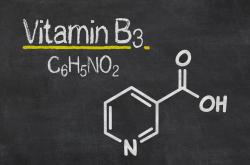Why Your Fatigue Could Mean You Suffer From Vitamin B12 Deficiency
There are many reasons why people suffer from low energy levels and general fatigue. One reason can involve a deficiency of the essential vitamin B12.

The body is an amazing machine, but like most machines it requires a certain level of precision to operate at peak efficiency. All of the various systems within the body need to be in balance and performing properly if you are to enjoy full health. Let even one component of that balance fall out of alignment, and the entire machine can come crashing to a halt.
For fatigue sufferers, this dynamic has always posed a special problem: given the vast number of balanced systems within the body, how can you ever get to the real source of exhaustion? After all, there are a number of factors that can contribute to the loss of energy that leads to fatigue. For most people, the easiest thing to do when exhaustion becomes chronic in nature is to treat it as though the fatigue represents a breakdown in adrenal function. However, in many cases the problem is as simple as a lack of adequate vitamin B12.
B12 and its Role in Your Body
So why is B12 important, you ask? It’s simple. This vitamin, like most other vitamins, is something that the body cannot produce on its own. Instead, you have to obtain your essential supply of B12 from the food you eat and from vitamin supplements. And it is essential! Your body relies on this vitamin to help it manufacture red bloods cells, DNA, and nerves. It is also vital in many other bodily functions. Research indicates that most adults require around two and a half micrograms of this critical vitamin each day.
And yet, a surprising number of people suffer from b12 deficiency. To be sure, younger people only suffer from this deficiency at a reported rate of one-tenth of one percent according to official estimates. However, that number increases to a full fifteen percent in older patients. It is also much higher than average among those who avoid dairy and meat in their diets. Moreover, many researchers and medical practitioners hold to the belief that this deficiency is much more common than the official statistics would suggest.
It is important to note that B12 deficiency can sometimes be caused by an inability to properly absorb the vitamin. Other factors can include things like birth control pills, diabetes medication, and other pharmaceutical products.
What Happens When B12 Is Not Available
It is important to note that a deficiency in B12 does not always guarantee that a person will suffer from fatigue. However, fatigue is one of the natural results that can occur when the body lacks this essential vitamin. This is due to the impact that the absence of B12 has on the red blood cells. Like iron deficiency, this vitamin deficit hits those cells especially hard, affecting hemoglobin and, by extension, the body’s ability to deliver oxygen and nutrients to the mitochondria for conversion to ATP. And like iron deficiency, inadequate supplies of B12 can lead to anemia.
Symptoms of B12 Deficiency
If you think you might be suffering from a lack of vitamin B12, just check to see whether you are experiencing any of these symptoms:
- Fatigue. We already explained this one, remember?
- Shortness of Breath. Because of the deficiency’s impact on your red blood cells, your body’s normal processing of oxygen can get disrupted too.
- Brain Fog. Without adequate B12, cognitive function and memory can be impaired.
- Weight Loss. This often occurs when B12 levels are too low. Sleep can also be disrupted, and you might experience GI difficulties.
- Tingling in the Extremities. Again, that impact on the blood can affect your circulation.
- Depression. Like brain fog, this is due to the deficiency’s impact on your neurological system.
- Hallucinations. This symptom is usually only present in advanced instances of deficiency.
How to Fix B12 Deficiency
There is some good news on this front though. Among all the various deficiencies that the human body can experience, a deficiency of B12 is one of the easiest to remedy. The trick is to know when to try to address B12 as a concern. Many medical experts recommend getting tested for B12 deficiency, but that is usually an unnecessary expenditure of time and resources. You see, B12 is a benign vitamin with no real harmful effects when you take more of it than you need. That makes it much different than iron, which can damage your liver when excessive amounts are introduced into your body.
So while you can get tested, your best bet for determining whether your vitamin B12 levels are too low is to simply take more of it. Add more meat to your diet, including foods like beef, tuna, eggs, chicken, milk, and fortified cereals - and take a supplement. Just remember, B12 is insoluble, so you will have to supplement with more than you need just to be sure that your body is absorbing it in sufficient quantities. For that reason, some experts recommend taking hundreds of micrograms a day, just to ensure that you get the two and a half micrograms you require.
The best part of adding this vitamin to your supplement regiment is that it can be an easy way to remedy fatigue if that condition is in fact being caused by vitamin B12 deficiency. If, however, you supplement for a full month and see no corresponding improvement in your energy levels, you should start considering other factors that might be contributing to your fatigue.
You might also be interested in:
- Vitamin B12 deficiency can be sneaky, harmful. http://www.health.harvard.edu/blog/vitamin-b12-deficiency-can-be-sneaky-harmful-201301105780
- Vitamin B12 Deficiency Symptoms: Much More Than Fatigue. http://www.motherearthnews.com/natural-health/vitamin-b12-deficiency-symptoms-zbcz1407.aspx
- Feeling fatigued or forgetful? You may be low in B12. http://www.chatelaine.com/health/wellness/feeling-fatigued-or-forgetful-you-may-be-low-in-b12/
- Vitamin B12 – The Energy Panacea? https://www.sciencebasedmedicine.org/vitamin-b12-the-energy-panacea
- B12 & Fatigue. http://www.livestrong.com/article/86559-b12-fatigue/












.jpg)





Leave a comment